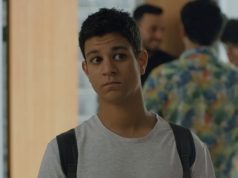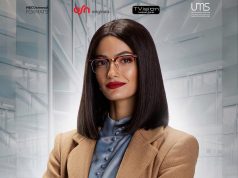We sat down for a one-on-one with director Myriam Ahmadi to discuss her series I Must Live. Already receiving plenty of critical accolade, the series addresses the struggle of those suffering from vitiligo, a skin condition in which pigment is lost from areas of the skin, causing white patches.
Miryam tells us why she thought this story needed to be told and shares a sneak peek into her upcoming project.
By Mariam Elhamy
How did you learn about Lujain Salah’s story and her battle against ignorance and prejudice while coping with vitiligo?
The story is about the thousands of people who are dealing with vitiligo, not just Lujain. I actually learned about Lujain after the script was written.
How were you able to portray the suffering of those thousands through the story of just one girl?
This process was very hard because we were afraid to make it seem like it’s one person’s story and struggle, especially after we’ve been into multiple households and researched a lot of cases on a very wide scope of people who have been dealing with the disease.
The number of cases has especially increased over the past 2 years because of the higher levels of stress. It wasn’t easy to take all these stories and put them into the one character that Jamila Awad portrays.
We sat with many people and learned all the details of the way they were bullied and the specific words that they heard as children. What came out is only but a glimpse of what their daily life is like.

Do you personally know anyone who has lived a similar experience? What can you tell us about vitiligo?
Yes, I personally know some cases. Vitiligo is an autoimmune disease, it could develop after you are born and it would increase with time by gradually spreading from the area it started. Other people might develop it at an older age as a result of stress and low immunity like in post-pregnancy.
Why did you choose vitiligo?
I chose vitiligo because it’s an important issue that no one has talked about before, neither in the Arab countries nor internationally. I did not relate it to women in particular I only chose it because I knew that it is a story that would affect and get sympathy from many people.
I believe that art is a powerful tool that you could use to easily educate and cultivate society in a very smooth and light way without lecturing. I really like real humanitarian topics that invoke emotion and that is what I focus on.
What advice would you give women on loving themselves despite unattainable industry beauty standards?
We have to accept ourselves and accept others as they are. Once we accept each other’s differences we’ll understand our own beauty. My advice is, accept and love yourself first so that others can love you too and ignore negative comments.

What advice would you give parents who feel helpless in the face of bullying their child is enduring?
There are two kinds of ways parents can deal with this situation. In the series we showed the father being supportive, empowering and encouraging his daughter to stand up for herself and be strong.
The mother on the other hand, lived in denial and could not believe or confront the disease, she wanted to protect her child from any emotional harm that the disease might cause her.
The message we wanted to portray here is that parents have to accept their children as they are no matter what condition they have.
Looking back over the past five years, has your work been aligned with your ultimate goals?
I surely drifted a bit; no one stays on one path throughout their whole career, but most of my projects resonated with my goals and were on the same track.

What drew you to I Must Live?
The topic. This topic is humane and untapped, either on a national level or a universal one. The sensitivity of this issue made me a bit frightened of the reaction of the mass audience, especially that we published it on TV before going online, and the audience of each platform is different from the other.
I was also afraid for the feelings of the patients of vitiligo, that some scenes might hurt them, but thankfully it didn’t.
Have you seen more opportunities opening up for female directors recently?
Yes, recently more topics have emerged that serve women. I’m seeing more and more female directors, directors of photography and set designers. This industry is expanding for women and I see a lot of potential for more growth, especially in the topics.
What’s one piece of advice you’d give young girls in general?
Just accept and be yourself and dream big and you’ll achieve it.
What can you tell us about a project you are currently working on?
I’m working on a very sensitive topic as well. It’s about a relationship between a married couple and it will be on Shahid, but we’re still working on the script.
Clothes: @villababoushka
Make-up: @aisha.helmy
Photography/Videography: Cairo West
Watch the interview on our channel
Actor on the rise Khaled Anwar: On Fame, Social Media and Taking risks





